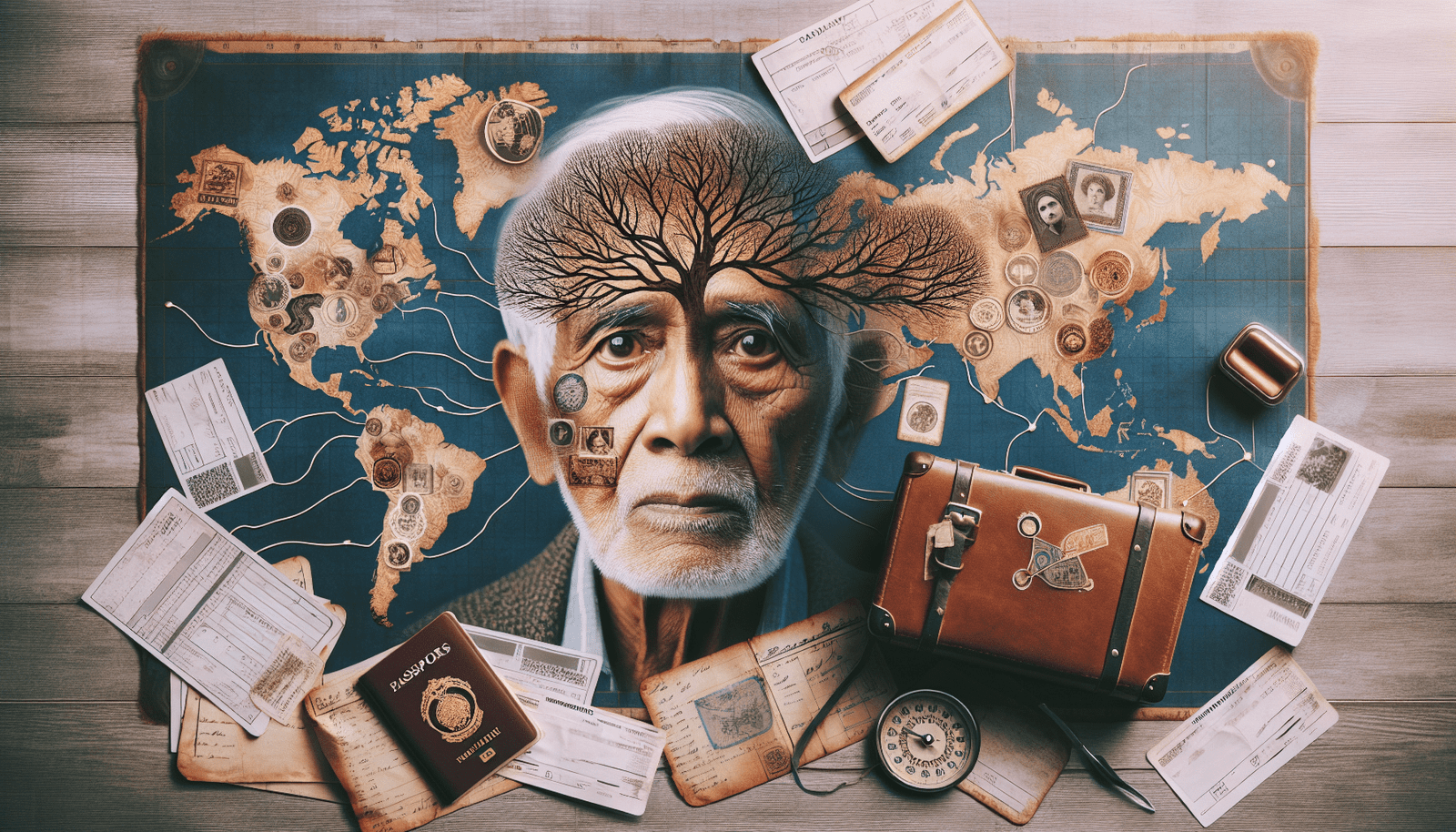Genealogy Tourism
Imagine standing outside your great-great-grandfather’s humble abode, tracing the very steps your ancestors may have walked centuries ago. This is the essence of genealogy tourism, an exciting new trend that combines travel and ancestry research to connect you with your roots in a deeply personal way. The idea of retracing family lineage is much more than merely completing a family tree. It’s about experiencing first-hand the native hometowns, traditions, and cultures that helped shape who you are today. With genealogy tourism, your past is alive, waiting to be rediscovered.

Understanding Genealogy Tourism
Genealogy tourism is an increasingly popular type of travel experience that involves touring places with historical or familial significance to understand and connect with one’s ancestry. The pursuit of deeply personal quests or the thirst to unravel familiar mysteries consistently drives people to trace their roots.
Definition of Genealogy Tourism
But what is genealogy tourism, exactly? At its core, genealogy tourism, or sometimes known as ancestry tourism or roots tourism, refers to a trend where individuals plan their travels around locations that hold significance to their personal or familial history. This can include the homeland of their ancestors, places where famous family members worked or lived, or regions that bear the cultural remnants of their ancestral traditions.
Emergence and Evolution of Genealogy Tourism
Genealogy tourism emerged from a heightened interest in history and heritage. This curiosity has always existed, but technological advancements in recent decades have made genealogical research more accessible, leading to the flourishing of this niche kind of tourism. It became a conscious quest for an individual’s personal identity, motivating travels to distant lands and unexplored histories.
Current Status and Popularity
Now, genealogy tourism is encountering a surge in popularity. As people become increasingly eager to understand who they are and where they come from, this niche market continues to thrive. Accentuated by rapid advancements in technology, the demand for genealogy tourism is on the rise and shows no sign of slowing down.
Purposes and Objectives of Genealogy Tourism
Exploring the Roots and Ancestry
One of the primary purposes of genealogy tourism is to connect with your roots. This form of travel allows you to step back in time and uncover who your ancestors were, the lives they lived, and how their experiences have contributed to who you are today.
Reconnecting with Relatives and Extended Family
Another key objective is the opportunity to reconnect with relatives and extended family members. Whether you encounter distant family members during your travels or you bring your family along on your journey, genealogy tourism fosters connections that transcend both time and space.
Cultural Exploration and Learning
Exploration and learning are substantial components of genealogy tourism. By visiting your ancestral homeland, you become intimately familiar with the culture, traditions, and lifestyle that played critical roles in shaping your ancestors’ lives—and indirectly, yours.
Searching for Historical and Genealogical Data
A central aspect of genealogy tourism is the active quest for historical and genealogical data. This may involve extensive research, visiting archives or libraries, and even consultation with experts. The goal is to collect and verify facts about your ancestry and trace your lineage as far back as possible.
Planning for Genealogy Tourism
Research Before Travel
Planning for a genealogical journey entails comprehensive research before you travel. You’ll need to gather as much information as you can about your ancestry, including names, dates, places, and events. This can involve tracing family records, undertaking online research, and possibly engaging the help of professional genealogists.
Choosing Relevant Destinations
Choosing the right destination is another crucial step in planning for genealogy tourism. Depending on your ancestry, this may bring you to different corners of the world. Fortunately, an increasingly globalized world makes traveling to even remote destinations easier than ever before.
Scheduling Visits to Museums, Archives, Churches, etc.
Your itinerary should include visits to local museums, archives, or churches. These are often treasure troves of historical and genealogical information. Meeting with local residents, historians, and genealogists can also provide valuable insights that you may not find in public records.

Role of Technology in Genealogy Tourism
Online Resources and Databases for Research
The role of technology in genealogy tourism cannot be overstated. Online resources and databases have revolutionized the way individuals conduct genealogical research. Websites like Ancestry.com and FamilySearch.org offer a vast amount of searchable records, enabling people to trace their family histories from the comfort of their homes.
Genealogy Software and Applications
There are also numerous software and applications dedicated to genealogical research. These tools can help you organize and interpret vast amounts of data, create family trees, and manage research tasks with ease.
DNA Testing for Genealogical Exploration
Perhaps the most cutting-edge technology aiding genealogy tourism is DNA testing. Companies like 23andMe and AncestryDNA offer products that reveal your genetic makeup and can link you to locations, cultures, and even people related to your ancestral past.
Challenges Encountered in Genealogy Tourism
Language Barriers
One of the challenges you might encounter in genealogy tourism is the language barrier. Old documents might be in different languages or scripts, and local residents might not speak English. Hence, learning a few phrases in the local language, or seeking the help of local guides, can significantly aid your search.
Access to Closed or Restricted Archives
Restricted or closed archives can also pose challenges. Some records are not open to the public due to privacy concerns or are only accessible to individuals with special permissions or qualifications.
Dealing with Incomplete or Damaged Records
In dealing with historical records, you may encounter instances where records are incomplete or damaged due to calamities or the passage of time. Accepting that there may be unanswered questions and being patient with the process are part of the journey of genealogy tourism.
Impact of Genealogy Tourism
Economic Impact
Genealogy tourism can bring significant positive economic impacts to the visited areas. As travelers visit archives, museums, and historical sites, they also spend money on accommodation, food, transportation, and local goods, bolstering the local economy.
Preservation and Reinvigoration of Local Cultures and Traditions
Genealogy tourism also aids in preserving and reinvigorating local cultures and traditions. As individuals learn more about their ancestral cultures, they can foster appreciation and perpetuation of these traditions, ensuring their lasting continuation.
Constructing Personal and Family Identity
For the individual, genealogy tourism plays a profound role in constructing personal and family identity. Knowing one’s roots can help build a sense of belonging, deepen familial bonds, and provide a unique perspective into one’s existence.
Case Studies in Genealogy Tourism
Prominent Destinations
Places known for emigration, like Ireland or Italy, and places of significant historical interest, such as Jerusalem, have become prominent destinations for genealogy tourism. Local governments in these places have recognized the benefits of catering to this niche, greatly benefiting their local economy.
Successful Stories from Genealogists
There are countless stories of genealogists who have gone on incredible journeys to uncover their roots, connecting with distant relatives, discovering ancestral homes, and unlocking family secrets hidden for generations. These stories not only serve as inspiration but also provide valuable pointers to fellow genealogy tourists.
Influence in Local Communities
Beyond the personal level, genealogy tourism also influences local communities—strengthening ties, promoting cultural understanding, and generating interest in local history and heritage among new and young generations.
Role of Private and Public sectors in Genealogy Tourism
Genealogy Tourism Services from Private Companies
Private companies, such as tour operators and genealogical research firms, play a significant role in facilitating genealogy tourism. They provide research services, organize heritage tours, or assist in planning itineraries based on your genealogical interests.
Government Initiatives and Support
Government initiatives often provide significant support in promoting genealogy tourism. This includes establishing and maintaining archives, facilitating access to public records, and promoting destinations with historical or cultural significance.
Future of Genealogy Tourism
Developing Trends
As interest in genealogy tourism continues to grow, it’s evident that the future holds more development and possibilities in this niche. With advancements in DNA technology and the ever-growing trove of genealogical data online, more people will likely embark on journeys to explore their heritage.
Projected Growth and Challenges
The industry is expected to grow, introducing both opportunities and challenges. Potential issues may include concerns over privacy and data security, challenges in dealing with fraudulent or misinterpreted information, and the need for education on both the personal and community levels about cultural sensitivity and ethical practices.
Expert Tips for Successful Genealogy Tourism
Preparation Measures
Experts recommend conducting extensive research, both online and offline, to prepare for your genealogy trip. Gather as much information as possible about your family’s history, areas of origin, and potentially significant landmarks or establishments.
Making the Most of Your Visit
Once on location, make the most of your visit. Aside from planned destinations, approach locals who might provide insights unavailable in formal records. Ask a lot of questions, take lots of photos and make sure to experience the culture, food, and traditions of the place.
Preserving and Sharing Findings
Bring along a journal or a reliable documenting device to keep track of your findings. After your journey, your discoveries can be preserved and shared with your family, further strengthening your familial bonds. This is a tangible showcase of your roots and can serve as an heirloom for future generations.
In conclusion, genealogy tourism offers a unique opportunity to explore your roots, learn about your cultural heritage, and forge deep-rooted connections with your family and ancestral past. It can be an incredibly enriching and personal experience, offering fresh perspectives on your personal identity, and a closer understanding of your place in the grand mosaic of human history.





Pingback: Heritage Travel - Luxury Travel 🔹